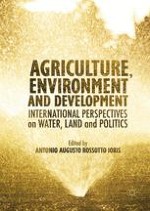2016 | OriginalPaper | Buchkapitel
5. Water, Land, Socioterritorial Movements, Labour, and Capital: Territorial Disputes and Conflictuality in Brazil
verfasst von : José Sobreiro Filho, Bernardo M. Fernandes, Tassio B. Cunha
Erschienen in: Agriculture, Environment and Development
Aktivieren Sie unsere intelligente Suche, um passende Fachinhalte oder Patente zu finden.
Wählen Sie Textabschnitte aus um mit Künstlicher Intelligenz passenden Patente zu finden. powered by
Markieren Sie Textabschnitte, um KI-gestützt weitere passende Inhalte zu finden. powered by
